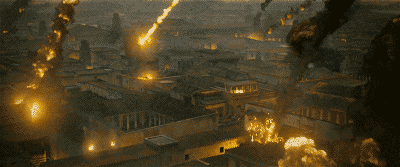Read the previous entry in the series here.
Read the next entry in the series here.
A chapter titled “Lords of the Three Realms” follows, and it opens with Tintaglia killing a bear and searching for signs of her kind after gorging upon it. She notes changes from what her ancestral memories tell her, and she worries as she continues her search.

Image from the Pompeii movie website, used for commentary
Malta muses on her straitened circumstances as she, the Satrap, and Kekki continue downstream. The Satrap inveighs heavily, and Malta fumes at him.
Tintaglia kills again, a boar, and she arrives at the site of a ruined Elderling town, far fallen from the glories she recalls it having had in her ancestral memories. She rages against the loss and begins to despair of being the last of her kind.
Malta wakes to see the form of Kekki in a heap in the boat, and she fears the other woman is dead. She is not, although she is in poor condition, and she strikes a strange deal with Malta, offering her aid if the younger woman will help her live. The Satrap sights a Chalcedean ship and hails it despite Malta’s protestations; the Chalcedeans take them aboard in some confusion, but are persuaded of the Satrap’s identity. He begins to ply his status with them, swiftly returning to his drug use and imperious hauteur; Malta is forced to consider changed circumstances and notes the Satrap’s revealed physical form with bemused disappointment. After she has cause for concern about Kekki again, she and the Satrap have another sharp exchange, and Malta realizes the water provided for the Satrap’s bath is from the Rain Wild River; she smiles as she realizes it will scald him and pours more onto him.
I note that the issue of addiction crops up again in the present chapter as in so much of the rest of the Realm of the Elderlings corpus, and I note how often in the books that such intoxicants are ascribed to disreputable types–particularly Chalced. I note, too, that misogynist patriarchal attitudes are explicitly and repeatedly ascribed to Chalced, along with many other reasons for scorn and opprobrium. I note also that–at least at this point–Chalced is a largely unseen other; it stands outside both the Six Duchies and the Bingtowner / Jamaillian polities, with rumors of its militaristic depredations and the actions of mercenary crews–not necessarily representative of the general population, and not necessarily accorded much agency or narrative perspective–the only real depictions of them. While the point is clearly made that Chalced is bad and that the qualities most associated with it are also bad, the kind of othering taking place is…not necessarily ideal.
Too, the issue of addiction is one that touches me more than many and certainly more as I do the reread than as I read the novels earlier. Hobb makes a point of portraying some of her addicted characters sympathetically–Brashen Trell in the present series and Fitz in the Farseer novels come to mind as examples. And Fitz, especially, suffers for his reliance on chemicals to do the work he is called upon to do. And that reminds me: the sympathetic characters use the drugs they do–usually stimulants of one form or another–chiefly to do their assigned work or to recover from having done such work. It’s something I see often among the clients I see in my current job; they are hooked on illegal or illegally used substances, yes, but not because they don’t want to work. Instead, they get hooked because they do want to work, and what they take either helps them to do more or helps them not hurt so damned bad from having done more. At first, anyway.
[…] Read the previous entry in the series here.Read the next entry in the series here. […]
LikeLike
[…] the previous entry in the series here.Read the next entry in the series […]
LikeLike
[…] conveys his long-held intent to die in the wake of the undoing of his species (about which some here and here). Fitz understands that Icefyre had come to Aslevjal for a quiet, dignified death, from […]
LikeLike
[…] preceding novels to read as commentary on the United States and its history (as noted here, here, here, here, and here, and probably ought to be elsewhere). There’s a long and storied history of […]
LikeLike
[…] captured by Chalcedeans; she spends a fair bit of Ship of Destiny in such circumstances, beginning here. It is therefore not a surprise to me, not only because I have read the book before (even if it was […]
LikeLike